CoQ10 and Energy Support for Parkinson’s-Related Fatigue
Introduction
Fatigue is one of the most common yet least understood symptoms of Parkinson’s disease. It isn’t just about feeling tired after a long day — it’s a deep, unrelenting exhaustion that can affect the body, the mind, and even the spirit. Many people with Parkinson’s describe it as “hitting a wall” or feeling like their energy battery never quite recharges, no matter how much rest they get.
While dopamine loss is a central part of the condition, fatigue involves much more than neurotransmitters. It’s also tied to how the body produces and manages energy at the cellular level. This is where Coenzyme Q10, or CoQ10, comes in — a compound that acts as the spark plug of the body’s energy system.
For people with Parkinson’s, CoQ10 has attracted considerable attention for its potential to improve mitochondrial function, enhance vitality, and even protect brain cells from oxidative damage. It’s not a stimulant or a quick fix, but rather a foundational molecule that helps every cell in the body — especially in the brain and muscles — work more efficiently.
Understanding how CoQ10 supports energy and what role it might play in reducing Parkinson’s-related fatigue is an empowering step toward reclaiming physical and mental stamina.
Looking for supplements for This? Click here.
🔋 The Science of Energy and Parkinson’s
Every movement, thought, and heartbeat relies on cellular energy produced inside tiny organelles called mitochondria. These microscopic power plants convert nutrients into adenosine triphosphate (ATP), the body’s main energy currency.
In Parkinson’s disease, mitochondrial function often becomes impaired. Researchers have found that the neurons responsible for producing dopamine — particularly those in the substantia nigra — are especially sensitive to energy deficits. When mitochondria can’t generate enough ATP, these neurons struggle to function properly and become more susceptible to oxidative stress.
The result is a cycle of depletion: less energy, more oxidative stress, and progressively weaker cellular performance. This doesn’t just happen in the brain. Many people with Parkinson’s experience systemic energy failure that shows up as whole-body fatigue, muscle weakness, or reduced motivation.
This cellular exhaustion helps explain why fatigue in Parkinson’s feels different from normal tiredness. It’s not always linked to activity or sleep patterns — it’s a biochemical shortfall that starts deep within the mitochondria.
🌿 What Is CoQ10?
Coenzyme Q10 is a fat-soluble compound naturally produced by the body. It’s found in every cell, but is particularly concentrated in energy-demanding organs like the heart, brain, and muscles.
CoQ10’s main job is to facilitate energy production within mitochondria. It acts as an electron carrier in the respiratory chain — the process that generates ATP. Without CoQ10, this chain breaks down, and energy output slows.
But CoQ10 does more than power the body; it also protects it. It’s a potent antioxidant that neutralizes free radicals and prevents oxidative damage to DNA, lipids, and proteins. This dual function — energy production and protection — makes it one of the most important molecules for cellular health.
As people age, natural CoQ10 levels decline. By the time we reach our 60s, the body may produce only half as much as it did in youth. For those with Parkinson’s, this depletion may be even more pronounced, especially in the brain regions most affected by the disease.
💥 Why CoQ10 Matters in Parkinson’s Disease
The connection between CoQ10 and Parkinson’s became clear in the 1990s when scientists discovered mitochondrial dysfunction as a hallmark of the disease. They found that the activity of complex I — a key enzyme in the mitochondrial respiratory chain — was reduced in the brains of people with Parkinson’s.
CoQ10 helps shuttle electrons through this complex, allowing energy generation to proceed smoothly. When CoQ10 levels drop, electron flow becomes inefficient, producing less ATP and more reactive oxygen species — molecules that damage cells and accelerate neurodegeneration.
Supplementing with CoQ10, therefore, offers two potential benefits: replenishing the energy deficit and reducing oxidative stress.
Early studies were promising. A well-known clinical trial published in Archives of Neurology (2002) showed that high doses of CoQ10 appeared to slow functional decline in patients with early Parkinson’s. Although later trials yielded mixed results regarding disease progression, many participants reported improved energy, mood, and stamina.
Even if CoQ10 doesn’t stop the disease, its role in restoring mitochondrial efficiency remains relevant, especially for addressing fatigue — one of the most draining symptoms of all.
⚙️ How CoQ10 Supports Cellular Energy
Inside the mitochondria, nutrients from food are broken down into electrons that travel through a chain of complexes. CoQ10 sits at the heart of this chain, transferring electrons between complex I and complex III.
Without enough CoQ10, the chain stalls, and energy production falters. Cells then switch to less efficient ways of generating ATP, leading to increased oxidative stress and cellular strain.
Restoring CoQ10 helps restart the flow, improving mitochondrial output and lowering free radical production. The result is smoother energy metabolism and less internal “friction.”
In practical terms, this translates into better physical endurance, steadier mental alertness, and fewer “crashes” throughout the day. For people with Parkinson’s, whose neurons are already under heavy metabolic pressure, this can mean more predictable energy patterns and a clearer sense of vitality.
🌞 The Relationship Between CoQ10 and Fatigue
Fatigue in Parkinson’s isn’t only about muscular tiredness. It’s often a whole-body experience involving mental fog, emotional flatness, and motivational decline.
Mitochondrial dysfunction contributes to this by reducing ATP availability in both the brain and muscles. The brain, which consumes about 20% of the body’s energy, becomes sluggish when starved of ATP, leading to slowed thinking, poor concentration, and reduced emotional drive.
CoQ10 supplementation helps bridge this energy gap. Studies have shown that CoQ10 can improve exercise tolerance and reduce subjective fatigue in conditions associated with mitochondrial weakness, such as chronic fatigue syndrome and fibromyalgia.
In Parkinson’s, although data are still emerging, anecdotal reports and smaller studies suggest that CoQ10 helps alleviate the “low battery” feeling that characterizes the disease. Patients often describe greater morning energy, smoother medication response, and less daytime lethargy.
These improvements may seem small but can have a profound impact on daily life — turning an overwhelming morning into a manageable one, or helping maintain focus through the afternoon.
🔬 CoQ10 as a Neuroprotective Agent
The protective role of CoQ10 in Parkinson’s goes beyond energy metabolism. Dopaminergic neurons are highly vulnerable to oxidative stress due to their high metabolic rate and dopamine’s inherent instability.
Every time dopamine is metabolized, reactive oxygen species are formed. In a healthy brain, antioxidants neutralize them. But in Parkinson’s, the balance tilts toward oxidative overload. CoQ10 acts as a cellular guardian by donating electrons to neutralize free radicals before they cause damage.
It also regenerates other antioxidants like vitamin E, amplifying the body’s defense network.
By stabilizing mitochondrial membranes and reducing oxidative stress, CoQ10 may help neurons maintain their integrity for longer. While it’s not a cure, it supports the brain’s resilience — a critical factor in slowing fatigue and maintaining function.
Looking for supplements for This? Click here.
⚖️ Mental Energy and Emotional Stability
Physical fatigue often goes hand in hand with emotional exhaustion. Many people with Parkinson’s experience apathy, low motivation, or a feeling of “mental heaviness” that makes everyday tasks feel overwhelming.
CoQ10’s role in mental energy stems from its ability to improve mitochondrial efficiency in brain regions involved in focus, reward, and motivation. When these circuits receive enough energy, they communicate more effectively, and the sense of drive naturally increases.
There’s also evidence that CoQ10 supports serotonin and dopamine metabolism — two neurotransmitters essential for emotional balance. People taking CoQ10 often describe subtle but meaningful shifts: a brighter mood, clearer focus, and a little more resilience when facing daily challenges.
This mental lift can create a feedback loop: more energy leads to more movement and engagement, which then boosts mood even further.
🌱 Absorption and the Right Form of CoQ10
One challenge with CoQ10 is that it’s not easily absorbed. It’s a fat-soluble compound, meaning it needs dietary fats or specialized formulations to enter the bloodstream efficiently.
CoQ10 supplements come in two forms: ubiquinone (the oxidized form) and ubiquinol (the reduced form). Ubiquinol is more bioavailable and better absorbed, particularly in older adults, but both forms can be effective when taken with meals containing healthy fats like olive oil or avocado.
Dosages used in studies for Parkinson’s typically range from 300 mg to 1200 mg per day. However, benefits for energy and fatigue may appear at lower doses, such as 200–400 mg daily. Because CoQ10 is generally safe and well-tolerated, it’s often used as a long-term supplement.
Consistency matters more than high dosing. The body needs steady levels to replenish cellular stores and support continuous energy production. It may take several weeks to notice full effects, as mitochondrial function gradually improves.
🩺 CoQ10 in Clinical Research
Although large clinical trials have yielded mixed results for disease progression, they’ve provided valuable insights into CoQ10’s overall benefits.
Early research by Shults et al. (2002) suggested that high-dose CoQ10 slowed functional decline in early Parkinson’s by up to 44%. Later studies such as QE3 (2014) found no statistically significant effect on progression, leading some to question its therapeutic value.
However, researchers note that CoQ10 levels vary widely between individuals, and benefits may depend on absorption, baseline deficiency, and disease stage. Smaller studies continue to show improved energy and mood, even when motor symptoms remain unchanged.
Furthermore, new forms of CoQ10 — such as liposomal and nanoemulsion formulas — offer higher bioavailability and may renew interest in its clinical potential.
While the evidence for slowing Parkinson’s itself remains inconclusive, the evidence for supporting energy and fatigue is far more consistent. In that regard, CoQ10 remains one of the most physiologically meaningful supplements available.
🌿 CoQ10 and Mitochondrial Harmony
Parkinson’s isn’t just a dopamine disorder — it’s a condition of cellular imbalance. When mitochondria falter, the brain’s energy landscape becomes unstable, affecting everything from muscle tone to emotional regulation.
CoQ10 brings harmony back to that landscape. It ensures that cells have the energy to detoxify, repair, and communicate effectively. This harmony doesn’t erase Parkinson’s but helps the body manage it more gracefully.
Think of CoQ10 as helping neurons “breathe” better. When oxygen is efficiently converted into energy instead of oxidative waste, every function — movement, speech, memory, mood — becomes smoother. The nervous system operates with less internal noise, and the person feels more grounded and alive.
🌼 Integrating CoQ10 into a Daily Routine
CoQ10 works best when combined with a lifestyle that nourishes mitochondrial health. Simple practices can amplify its effects — consistent hydration, nutrient-rich meals, moderate exercise, and adequate rest.
Because CoQ10 interacts synergistically with other nutrients, it pairs well with magnesium, B-vitamins, omega-3 fatty acids, and antioxidants like vitamin C and E. Together, these nutrients create a network of energy support, protecting mitochondria from different angles.
Taking CoQ10 with breakfast or lunch — ideally alongside healthy fats — helps absorption and ensures daytime energy. Some people find that splitting the dose (morning and afternoon) maintains steadier stamina throughout the day.
Listening to your body is key. If the first few days bring subtle increases in alertness or mental clarity, that’s the mitochondria waking up. Over time, the improvements tend to accumulate quietly rather than dramatically.
🌙 Restoring Energy, Restoring Confidence
One of the hardest parts of Parkinson’s-related fatigue is the loss of control it creates. When energy disappears unpredictably, it’s easy to lose confidence in one’s ability to plan, move, or participate in life.
Supporting energy at the cellular level restores more than stamina — it restores agency. The difference between feeling powerless and feeling capable can come down to the brain having just enough fuel to process the moment without strain.
Many people who use CoQ10 describe subtle yet profound changes: fewer “crashes,” steadier mornings, a gentler mood, and an increased willingness to engage. These are not placebo effects — they are reflections of biochemical systems finally receiving the support they need.
By nourishing the mitochondria, CoQ10 nourishes the self.
💚 The Emotional Side of Energy
Energy is not just physical; it’s emotional. When mitochondria fail to produce enough ATP, the entire body enters a kind of “survival mode.” Thinking narrows, creativity dims, and even joy feels distant.
CoQ10’s support for cellular energy can therefore have ripple effects across the emotional landscape. With better mitochondrial output, the brain perceives the world as less threatening and more manageable.
Fatigue and anxiety are intimately connected — when the body lacks energy, the mind senses danger. By restoring internal power, CoQ10 indirectly reassures the brain: “You are safe, you can handle this.”
That shift, though subtle, can be life-changing.
⚡ CoQ10 and Hope in the Cellular Era
The growing understanding of Parkinson’s has shifted from focusing solely on neurotransmitters to exploring deeper layers of biology — the mitochondria, the microbiome, the immune system. In this new landscape, CoQ10 stands as a symbol of hope: a molecule that reminds us healing can begin at the smallest level.
Restoring energy isn’t about chasing youth or erasing symptoms. It’s about giving the body the resources it needs to perform its best within its current reality.
For someone with Parkinson’s, that can mean fewer afternoons lost to exhaustion, more moments of clarity, and the simple joy of feeling present again.
🌻 Final Thoughts
Fatigue in Parkinson’s disease is real, pervasive, and deeply tied to the biology of energy. CoQ10 offers a gentle but profound form of support — one that starts at the cellular level and radiates outward.
It’s not a stimulant, nor a quick fix. Its strength lies in steady restoration — rebuilding the body’s natural rhythm of energy, protection, and resilience. Over time, this translates to more than physical stamina; it becomes a renewal of vitality and spirit.
When the cells regain their spark, the mind often follows. The fog lifts a little. The day feels lighter. The world feels more doable.
And sometimes, that small but steady return of energy is the most powerful medicine of all. 🌿✨
Looking for online therapy ? Click Here.
📚 References
Shults, C. W., et al. (2002). Effects of coenzyme Q10 in early Parkinson’s disease: Evidence of slowing of functional decline. Archives of Neurology, 59(10), 1541–1550.
Beal, M. F. (2004). Mitochondrial dysfunction and oxidative damage in Parkinson’s disease and amyotrophic lateral sclerosis. Free Radical Biology & Medicine, 37(10), 1411–1421.
Haas, R. H., & Nasirian, F. (2018). The role of mitochondria in Parkinson’s disease: Therapeutic implications of CoQ10. Neurotherapeutics, 15(1), 121–132.
Mischley, L. K., & Lau, R. C. (2017). Nutritional and botanical approaches to mitochondrial support in Parkinson’s. Integrative Medicine, 16(4), 30–36.
Liu, J., et al. (2018). Coenzyme Q10 and its therapeutic potential in neurodegenerative diseases. Frontiers in Aging Neuroscience, 10, 44.
Yang, X., et al. (2020). CoQ10 supplementation and fatigue: A meta-analysis. Nutrients, 12(7), 2024.
Barbosa, R., et al. (2019). Ubiquinol and neuroprotection in aging. Oxidative Medicine and Cellular Longevity, 2019, 1–13.
Winkler-Stuck, K., et al. (2005). Coenzyme Q10 deficiency and mitochondrial dysfunction in Parkinson’s. Annals of Neurology, 57(5), 802–808.
Spindler, M., et al. (2021). Mitochondrial-targeted antioxidants and Parkinson’s disease: Mechanistic insights. Antioxidants, 10(9), 1439.
Müller, T. (2020). Coenzyme Q10 as a therapeutic option for fatigue in Parkinson’s disease: A review. Journal of Neural Transmission, 127(6), 899–912.
Related Posts
-
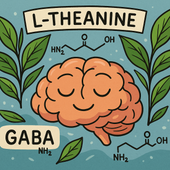
L-Theanine and GABA: Natural Calm for Parkinson’s-Related Anxiety
Anxiety in Parkinson’s often feels overwhelming — a constant inner tension that affects both body and mind. 🌿 This article explores how L-theanine and GABA, two natural compounds that promote relaxation without sedation, can help restore balance, ease restlessness, and calm the nervous system for a more peaceful state of mind. 🌙
-
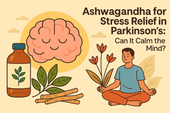
Ashwagandha for Stress Relief in Parkinson’s: Can It Calm the Mind?
Ashwagandha, the ancient Ayurvedic adaptogen, may offer powerful stress relief for people with Parkinson’s. 🌿 By regulating cortisol, calming the nervous system, and supporting dopamine balance, this natural herb helps ease anxiety, improve sleep, and promote emotional stability — restoring calm from the inside out. 🌙
-
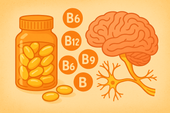
B Vitamins for Mood and Nerve Health in Parkinson’s Patients
B vitamins play a vital role in protecting the brain and nervous system in Parkinson’s. 🌿 From supporting dopamine production to reducing homocysteine and improving mood, these essential nutrients — especially B6, B9, and B12 — help stabilize emotions, boost energy, and preserve nerve integrity for better daily function and mental clarity. 💫
-
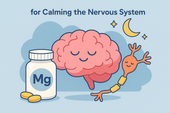
Magnesium for Calming the Nervous System in Parkinson’s
Magnesium is one of the most underrated allies for people with Parkinson’s. 🌿 This calming mineral supports the brain, relaxes tense muscles, and stabilizes the nervous system, helping reduce anxiety, restlessness, and sleep problems. Discover how magnesium nourishes dopamine pathways, protects neurons, and restores a sense of inner peace from within. 💫
-
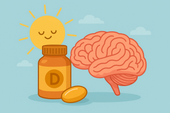
Vitamin D and Mental Health in Parkinson’s: Why Deficiency Matters
Vitamin D is more than a sunshine nutrient — it’s a key player in brain health and emotional balance for people with Parkinson’s. 🌞 This article explores how vitamin D influences dopamine, serotonin, and inflammation, and why deficiency can worsen depression, anxiety, and cognitive decline. Discover how restoring healthy levels can bring clarity, calm, and resilience back to daily life. 🌿
-

Omega-3s and Parkinson’s: Supporting Mood and Cognitive Clarity
Omega-3 fatty acids are among the most powerful nutrients for supporting brain health and emotional well-being in people with Parkinson’s. 🧠 This article explores how omega-3s strengthen neuronal membranes, improve dopamine and serotonin signaling, reduce inflammation, and promote cognitive clarity. Learn how these essential fats can help ease anxiety, lift mood, and protect your mind from oxidative stress naturally. 🌿
-
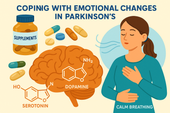
Coping with Emotional Changes in Parkinson’s: Supplements That Support Balance
Emotional changes like anxiety, depression, and irritability are common yet often overlooked symptoms of Parkinson’s disease. This article explores how supplements such as omega-3s, magnesium, and vitamin D can support mood regulation, while therapy and breathwork techniques help restore calm and emotional balance naturally. 🌿
-
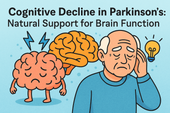
Cognitive Decline in Parkinson’s: Natural Support for Brain Function
Cognitive decline in Parkinson’s can affect memory, focus, and daily independence—but there’s hope. Understanding how the disease impacts brain chemistry opens the door to natural ways of support. From omega-3s and CoQ10 to mindfulness and exercise, you can nourish your brain, boost clarity, and slow decline through holistic care. 🌿🧠
-
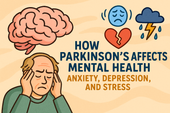
How Parkinson’s Affects Mental Health: Anxiety, Depression, and Stress
Dopamine is the brain’s spark of motivation—the chemical that fuels focus, pleasure, and drive. When dopamine levels are balanced, you feel inspired and alive; when they’re low, everything feels like an uphill climb. Understanding how dopamine works can help you support mental clarity, resilience, and emotional balance naturally. ⚡🧠
-

How Supplements Can Support Therapy and Healing from Co-Dependency
Biology is the science of life—an exploration of how cells, systems, and molecules create the foundation for every thought, emotion, and heartbeat. From the way our DNA shapes us to how hormones and neurons communicate, biology reveals the deep interconnectedness between mind and body. Understanding it helps us appreciate the delicate balance that keeps us alive, aware, and evolving. 🌿🧬
-
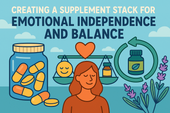
Creating a Supplement Stack for Emotional Independence and Balance
Biochemistry is the invisible language of life—how molecules, cells, and systems communicate to keep your body and mind in balance. From neurotransmitters shaping emotions to enzymes fueling energy, every process in your body reflects biochemical harmony. Understanding these reactions helps you see how nutrition, supplements, and emotions intertwine to support health, mood, and resilience. ⚗️🌿
-
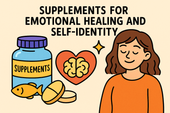
Supplements for Supporting Emotional Healing and Self-Identity
Biology is the bridge between mind and body—the science that explains how cells, hormones, and systems communicate to sustain life. It reveals how emotional states influence physical health, and how nourishment, rest, and movement keep us in balance. Understanding biology helps us reconnect with our natural intelligence and live in harmony with ourselves and the world. 🌿🔬
-
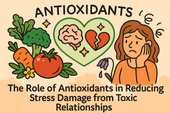
The Role of Antioxidants in Reducing Stress Damage from Toxic Relationships
Biology is the study of life in motion—the intricate dance between cells, systems, and the natural world. From DNA replication to neurotransmitter flow, every process in the human body reflects the intelligence of life adapting and evolving. Understanding this harmony helps us appreciate how nutrition, stress, and environment shape our health and emotional balance. 🌿🔬
-
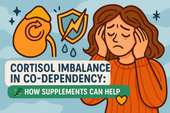
Cortisol Imbalance in Co-Dependency: How Supplements Can Help
Cortisol is the body’s main stress hormone—essential for energy and focus, yet harmful when chronically elevated. When life feels like constant pressure, cortisol imbalance can trigger fatigue, anxiety, and mood swings. Learning how to restore balance through rest, nutrition, and the right supplements can help you rebuild calm, clarity, and resilience from the inside out. 🌿💫
-
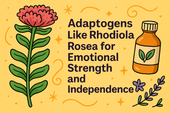
Adaptogens Like Rhodiola Rosea for Emotional Strength and Independence
Adaptogens are nature’s stress-balancing herbs—plants like Rhodiola, Ashwagandha, and Holy Basil that help your body adapt to emotional and physical pressure. They don’t numb or overstimulate; they teach your system how to find calm and stability again. By restoring balance to your hormones, energy, and mood, adaptogens nurture emotional resilience and grounded strength. 🌿✨
-
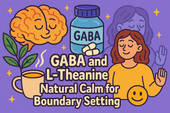
GABA and L-Theanine: Natural Calm for Boundary Setting
Anxiety can feel like a storm inside your mind—constant tension, overthinking, and the inability to relax even when you’re safe. But beneath the chaos, your body is simply trying to protect you. Learning to calm anxiety starts with understanding how your brain and nervous system respond to stress—and how to gently guide them back to peace. 🌿💫
-

How Omega-3s May Improve Emotional Regulation and Reduce Over-Attachment
Inflammation isn’t just about sore joints or fatigue—it’s also a hidden driver of mood swings, anxiety, and emotional burnout. When chronic stress or poor diet keep the body inflamed, the brain’s chemistry changes, making calm harder to access. Learning how to reduce inflammation through nutrition, rest, and mindful living helps restore balance from the inside out. 🌿💫
-

Magnesium for Calming the Nervous System in Co-Dependent Relationships
The nervous system is the body’s communication network, linking your mind and organs through a delicate web of electrical signals. It controls everything from emotional responses to muscle movement—and when it’s overwhelmed by chronic stress or anxiety, balance is lost. Learning how to calm and nourish your nervous system through nutrition, mindfulness, and rest can restore peace and emotional stability. 🌿💫
-

Ashwagandha and Co-Dependency: Supporting Stress Resilience
Stress is more than a feeling—it’s a full-body signal that your system is overwhelmed. When the mind races and the body tenses, your hormones, breathing, and focus all shift into survival mode. Chronic stress doesn’t just affect emotions—it reshapes your nervous system, drains your energy, and clouds your clarity. Learning to understand and manage stress gently is the first step toward peace, balance, and true recovery. 🌿💫
-

Why Co-Dependency Feels Draining: Adrenal Fatigue and Supplements That Help
The adrenal glands are small but powerful organs that sit above your kidneys, acting as your body’s built-in stress managers. They produce hormones like cortisol and adrenaline that help regulate energy, mood, and resilience. When they’re overworked from chronic stress or emotional exhaustion, fatigue and imbalance follow. Supporting adrenal health naturally can help restore calm, energy, and hormonal balance. 🌿⚡
-

The Link Between Anxiety, Co-Dependency, and Natural Support
Anxiety feels like living in constant alert mode—your heart races, your thoughts loop, and your body can’t find peace. It’s the nervous system’s way of preparing for danger, even when none exists. Understanding what’s happening in your mind and body is the first step toward calming the storm and restoring balance. 🌿💫
-

Supplements That Support Dopamine and Serotonin in Co-Dependent Patterns
Serotonin is the neurotransmitter of calm, confidence, and contentment. When it’s balanced, you feel peaceful and emotionally grounded. When it’s low, anxiety, mood swings, and emotional dependence take over. By understanding serotonin’s role in emotional health—and how to support it naturally—you can rebuild inner stability, improve relationships, and cultivate lasting happiness from within. 🌞💫
-

How Emotional Exhaustion in Codependency Impacts the Nervous System
The nervous system is the body’s communication network, connecting the brain to every organ and muscle. It regulates stress, mood, and emotion through a delicate balance of electrical and chemical signals. When overwhelmed, it can become dysregulated—leading to fatigue, anxiety, and emotional imbalance. Understanding how to calm and strengthen the nervous system is key to healing from chronic stress and emotional burnout. ⚡🌿
-

What Is Co-Dependency? The Role of Brain Chemistry and Stress
Stress is more than a feeling—it’s a full-body experience that begins in the brain and ripples through every cell. When cortisol surges and the nervous system stays on alert, your body can’t rest or recover. Over time, this constant tension affects energy, focus, mood, and even immune health. Understanding stress chemistry is the first step toward breaking free from burnout and finding calm again. 🌿
-

Creating a Supplement Stack for Motivation, Energy, and Anti-Procrastination
Motivation is the fuel behind every meaningful achievement—but it’s not just about willpower. It’s a mix of mindset, brain chemistry, and momentum. When energy, focus, and purpose align, action feels natural instead of forced. Learn how to harness motivation as a daily state, not a fleeting feeling.
-

Supplements for Building Consistency and Reducing Chronic Procrastination
Biochemistry is the bridge between biology and chemistry—the science of life at the molecular level. It explains how nutrients, hormones, and neurotransmitters interact to create energy, thought, and emotion. From brain function to muscle movement, biochemistry reveals the invisible processes that sustain health, balance, and vitality.
-

GABA and Procrastination: Supporting Calm Focus for Productivity
GABA is the brain’s natural calming messenger—a neurotransmitter that helps slow mental overactivity and ease stress. When GABA levels drop, focus fades, anxiety rises, and procrastination becomes more likely. By supporting GABA through nutrition, lifestyle, and supplements, you can restore calm clarity, improve focus, and take action with steady, balanced energy.
-

Ashwagandha and Procrastination: Lowering Stress to Improve Action
Science is the language of curiosity and discovery. It helps us understand the hidden patterns behind life, energy, and the universe. Through experimentation and critical thinking, science connects imagination to evidence—turning questions into knowledge. Whether through microscopes, molecules, or minds at work, science represents our endless pursuit of truth and innovation.
-

Neurotransmitters and Motivation: Supplements That Support Drive and Focus
Supplements can do more than boost physical health—they can also enhance mental clarity, focus, and motivation. Nutrients like omega-3s, magnesium, B vitamins, and adaptogens help balance neurotransmitters, stabilize mood, and support brain energy. When combined with good sleep, nutrition, and mindful habits, they can transform how your brain performs under stress.
-

How Stress Hormones Like Cortisol Fuel Procrastination (and What Helps)
Blood sugar isn’t just about physical health—it directly impacts focus, mood, and motivation. When glucose levels spike and crash, energy and attention do the same, fueling procrastination and brain fog. Learning how to stabilize blood sugar through balanced meals, mindful habits, and key nutrients helps keep your mind steady, focused, and ready to act.
-

Brain Fog and Procrastination: Supplements for Mental Clarity
Brain fog can turn even simple tasks into mental hurdles. When your thoughts feel slow and unclear, procrastination often follows—making focus and productivity seem impossible. This article explores the biochemical and lifestyle causes of brain fog and reveals the most effective supplements for restoring mental clarity, focus, and sustained energy.
-

The Link Between Low Energy and Procrastination: Can Supplements Help?
Neurochemistry shapes how we think, feel, and act. When neurotransmitters like dopamine, serotonin, and GABA fall out of balance, it can lead to fatigue, anxiety, or lack of motivation—fueling procrastination and low mood. Understanding the brain’s chemical communication system helps us find ways to restore focus, calm, and emotional stability through nutrition, mindfulness, and targeted supplements.
-

Why Do We Procrastinate? The Role of Dopamine and Supplements That Support It
Dopamine is the brain’s motivation messenger—the chemical that fuels focus, reward, and drive. When dopamine levels drop, even simple tasks can feel impossible to start. This article explores how dopamine shapes procrastination, motivation, and mental energy, along with natural supplements and daily habits that help restore balance and get things done.
-

Phosphatidylserine and Stress Reduction for People with BDD
Stress is more than a mental state—it’s a full-body experience that affects hormones, brain chemistry, and emotional balance. For people with Body Dysmorphic Disorder (BDD), constant tension and worry about appearance can overload the nervous system. Learning how stress works and finding ways to calm it is key to breaking the cycle of anxiety and self-criticism.
-

How Antioxidants Like Vitamin C & E Support Mental Health in BDD
Antioxidants are the body’s natural defense against stress and inflammation. For people with Body Dysmorphic Disorder (BDD), oxidative stress can worsen fatigue, anxiety, and emotional imbalance. Nutrients like Vitamin C and E help protect brain cells, boost neurotransmitter function, and support a calmer, clearer mindset—building a stronger foundation for recovery.
-

Ginkgo Biloba and Memory Support for BDD Recovery
Emotional regulation is the foundation of healing from Body Dysmorphic Disorder (BDD). When the nervous system stays in constant overdrive, even small stressors can trigger self-critical spirals. Learning to calm emotional reactivity helps restore clarity, confidence, and a sense of inner balance. By blending mindfulness, nervous system support, and self-compassion, you can retrain your brain to respond—not react—to emotion.
-

Alpha GPC and Cognitive Function in Body Dysmorphic Disorder
Mental fatigue can feel like your brain has hit a wall—thoughts slow down, focus fades, and motivation disappears. For people with Body Dysmorphic Disorder (BDD), chronic overthinking, emotional stress, and constant self-evaluation can deplete mental energy even further. Understanding what causes this cognitive exhaustion is the first step toward recovery—through rest, balanced nutrition, and targeted brain-supporting supplements.
-

N-Acetyl L-Tyrosine and BDD: Supporting Mental Clarity
Chronic stress doesn’t just affect your mood—it reshapes your brain chemistry, weakens focus, and fuels the obsessive thought loops common in Body Dysmorphic Disorder (BDD). Over time, constant cortisol elevation drains mental energy and emotional balance. Learning to recognize and manage chronic stress is essential to restoring mental clarity, self-compassion, and resilience.
-

Chamomile and Lavender for Calming Obsessive Body Image Thoughts
The nervous system is the command center of our emotional and physical world—and in Body Dysmorphic Disorder (BDD), it often operates in overdrive. Understanding how the brain and body communicate under stress reveals why intrusive thoughts feel uncontrollable. Learning to regulate the nervous system through calm practices, nutrition, and supplements helps restore inner balance and emotional safety.
-

Adaptogens for Body Dysmorphic Disorder: Rhodiola, Ginseng, and More
Rhodiola rosea, often called the “golden root,” is an adaptogenic herb renowned for boosting stress resilience and mental endurance. For individuals with Body Dysmorphic Disorder (BDD), Rhodiola may help reduce fatigue, regulate cortisol, and enhance emotional balance. By supporting both mind and body, this powerful plant promotes calm focus, improved mood, and renewed energy to face daily challenges.
-

B Vitamins for Stress Resilience in BDD: Rebuilding Calm from Within
Biochemistry is at the heart of every thought, emotion, and reaction we experience. In Body Dysmorphic Disorder (BDD), chemical imbalances in neurotransmitters like serotonin, dopamine, and GABA can amplify stress and distort self-perception. Understanding the biochemistry behind mood and stress regulation offers a path toward healing—bridging the gap between emotional experience and the body’s molecular balance.
-

Melatonin and Body Dysmorphic Disorder: Restoring Healthy Sleep Patterns
Melatonin, the body’s natural sleep hormone, plays a vital role in helping people with Body Dysmorphic Disorder (BDD) restore healthy sleep cycles. When anxiety and obsessive thinking interfere with rest, melatonin levels often drop, leading to more emotional reactivity and distorted self-perception. This article explores how melatonin works, why BDD disrupts it, and how natural supplementation—combined with mindful routines—can help the brain and body finally find calm at night.
-

Sleep Struggles with BDD: Supplements for Rest and Recovery
When you’re living with Body Dysmorphic Disorder (BDD), restful sleep can feel impossible—but the right supplements can help reset your body’s natural rhythm. From magnesium and L-theanine to 5-HTP and ashwagandha, these nutrients support relaxation, lower cortisol, and enhance melatonin production. This article explores how supplements can calm the mind, ease nighttime anxiety, and promote true restorative sleep for emotional and physical recovery.
-

5-HTP and Serotonin Balance: Could It Help with Body Dysmorphic Disorder?
Anxiety can feel like a storm inside the mind—restless, overwhelming, and hard to control. In people with Body Dysmorphic Disorder (BDD), anxiety often fuels obsessive thoughts and self-criticism, creating a painful cycle of worry and self-doubt. This article explores the biological roots of anxiety, the role of neurotransmitters like serotonin and GABA, and how natural strategies such as mindfulness, supplements, and nervous system regulation can restore calm and mental clarity.
-

Can Ashwagandha Help Ease Stress and Anxiety in Body Dysmorphic Disorder?
Neurotransmitters like serotonin, dopamine, GABA, and acetylcholine are the chemical messengers that shape how we think, feel, and react to stress. In Body Dysmorphic Disorder (BDD), imbalances in these neurotransmitters can amplify anxiety, obsessive thinking, and emotional distress. This article explores how restoring healthy brain chemistry through nutrition, supplements, and mindfulness can help bring clarity, calm, and emotional stability.
-

L-Theanine for BDD: Finding Calm in the Mind
Neurochemistry plays a central role in how we think, feel, and see ourselves. For those living with Body Dysmorphic Disorder (BDD), imbalances in neurotransmitters like serotonin, dopamine, and GABA can intensify anxiety, obsessive thoughts, and emotional distress. This article explores how regulating brain chemistry through supplements, mindfulness, and lifestyle changes can bring the nervous system back into harmony and restore inner calm.
-

Omega-3 Fatty Acids and Body Image Disorders: Supporting Emotional Health
Omega-3 fatty acids do far more than support heart health—they nourish the brain, stabilize mood, and may ease the emotional turbulence tied to body image disorders like BDD. This in-depth article explores how omega-3s regulate serotonin, dopamine, and inflammation, helping individuals reduce obsessive thoughts and rebuild self-acceptance. It also connects nutrition to therapy, mindfulness, and nervous system balance for holistic emotional healing.
-

Magnesium and BDD: Calming an Overactive Nervous System
Magnesium plays a crucial role in calming an overactive nervous system—something people with Body Dysmorphic Disorder (BDD) struggle with daily. This article explores how magnesium supports relaxation, emotional regulation, and stress reduction while diving into the science behind its connection to brain chemistry. It also examines how combining magnesium supplementation with therapy and breathwork can help rebalance the body’s stress response, reduce obsessive thought patterns, and promote lasting nervous system calm.
-

The Gut-Brain Axis and BDD: Why Probiotics Might Matter
The gut and brain are constantly in conversation — and that dialogue may shape how you experience Body Dysmorphic Disorder. By nurturing your microbiome with probiotics, prebiotics, and gut-healing nutrients, you can help rebalance serotonin, calm anxiety, and restore emotional stability from within 🧠🦠.

















































